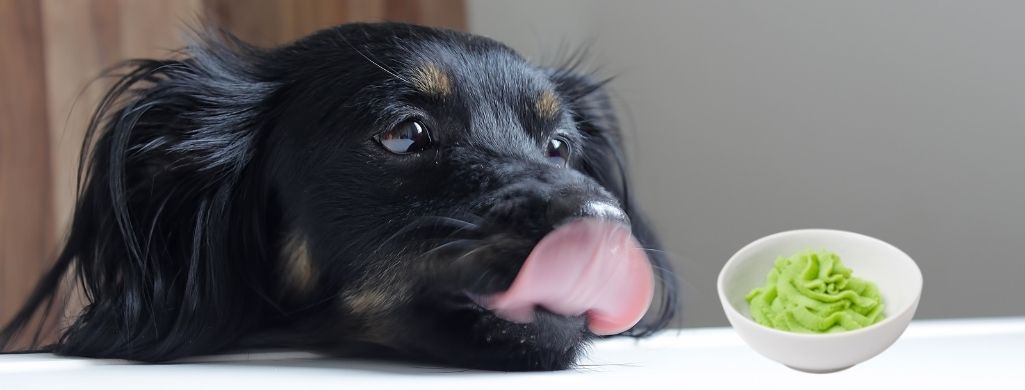
Your dog probably ate wasabi by accident — very few people would give wasabi to their pets, knowing how spicy it is.
Since you love your dog, you’re probably wondering: can dogs eat wasabi at all? Or, rather, how harmful is it?
Let’s find out more about wasabi and when you should be concerned.
Can Dogs Eat Wasabi?
Dogs shouldn’t eat wasabi because canines can’t digest the majority of what makes up wasabi. Although wasabi offers some health benefits for humans, dogs should avoid it.
If your dog eats wasabi, they may experience irritation of the gastrointestinal tract — vomiting and diarrhea included.
Wasabi is not necessarily toxic to dogs but can be harmful. Spicy foods can make it hard for your dog to breathe, and even cause some burns!
So, should dogs consume wasabi? No, they should not.
Also, did you know that 99% of the wasabi in the US is fake? The wasabi consumed by humans is usually made with green food coloring, citric acid, horseradish, and mustard. These can cause serious health problems for dogs when eaten.
Wasabi can also contain other unknown ingredients like pesticides or preservatives. Definitely not something you want for your pooch.
Is Wasabi Bad for Dogs?
The main problem with wasabi is its spiciness, which can cause digestive and respiratory problems for dogs.
Most dogs will naturally be frightened off by the pungent smell of wasabi. The strong, spicy stench can irritate their sensitive noses.
Other canines may love the smell! Meaning they might be attracted to and even eat it.
The smell and spiciness in wasabi both come from the compound allyl isothiocyanate. This compound is wasabi’s natural defense mechanism against herbivores like cows, horses, and deer.
If wasabi is strong enough to ward off wild animals, can you imagine the irritation and pain it can cause dogs?
But that’s not the only reason for concern — according to The Washington Post, 99% of wasabi in the US is not wasabi at all. It is a mix of citric acid, horseradish, and green food dye.
Citric acid is especially detrimental to a dog’s health. Citric acid can irritate the central nervous system and even cause CNS depression!
Horseradish and artificial dye aren’t too good either.
So, it might be best to hold off on sharing spicy wasabi with your four-legged friend.
Is Wasabi Toxic to Dogs?
Wasabi is not toxic to dogs, but that doesn’t mean you should use it as a treat.
Strong, spicy food can burn your dog’s mouth and cause symptoms like vomiting, bloating, and diarrhea.
Furthermore, wasabi can seriously irritate your dog’s throat. In worst case scenarios, it can even become constricted, making it hard for your dog to breathe.
Can Dogs Eat Wasabi Peas?
If dogs eat wasabi peas, they can still be OK.
Wasabi peas are roasted peas coated in wasabi spice.
Most dogs can’t digest dried spices like wasabi, so they could pass through the digestive system. Just make sure your pet doesn’t eat more than one at a time — vomiting and diarrhea may happen if your dog eats too many peas.
Wasabi peas also have starch, sugar, salt, and oil. These lead to long-term health problems, so wasabi peas can’t be considered healthy dog treats.
Can Dogs Eat Wasabi Almonds?
No, dogs should not eat wasabi almonds for several reasons.
First, canines can’t digest raw almonds. Almonds are not poisonous to dogs, but they can lead to gastric problems.
Second, these problems are only amplified by spicy wasabi.
Third, many other ingredients in wasabi can be hazardous for dogs. Wasabi almonds often have corn flour, processed salt, and starch syrup in them. If a dog eats too many of these, it can cause a slew of health problems.
Can Dogs Eat Wasabi Paste and Sushi?
No, canines can’t eat wasabi paste.
The main problem with wasabi is the allyl isothiocyanate compound. This can cause burning pain in your dog’s mouth and nose. If your canine eats wasabi paste by accident they can experience these symptoms.
But what about sushi? Surely the amount of wasabi in sushi is acceptable for canines, right?
Sushi can be extremely dangerous for dogs. Sushi contains raw fish that can have parasites or bacteria. Suppose your pet eats too much of this food. In that case, they can experience vomiting, diarrhea, weight loss, and painful enlargement of the abdomen.
If you see these symptoms, call the vet.
Additionally, too much rice and spices are not good for your pet’s tummy, either. Wasabi paste is used sparingly in sushi but can still be an issue.
What’s the alternative? The best alternative to sushi is cooked protein with steamed rice. This can be beneficial for your canines because they are easily digestible and rich in protein!
So, sorry, but your Fido can’t join in on the takeout dinner. But you can try some pet-friendly recipes, so your pooch isn’t left out.
What Should You Do if Your Dog Eats Wasabi?
If your dog ate wasabi — especially a significant amount — follow these steps:
- Don’t panic. If your dog ate a small amount, it’s unlikely anything bad will happen.
- Make sure to remove any wasabi leftovers from the dog’s mouth and rinse their mouth and snout with water. Clear the wasabi off your dog’s face, since it can irritate their eyes. But you might have to catch your dog first, as your pooch will likely run away!
- Take away any remaining wasabi, so the dog doesn’t eat more of it.
- Wasabi can make your dog thirsty, so never restrict your dog’s access to water and give them plenty to drink.
- Monitor their wellbeing — if you notice any symptoms like vomiting or diarrhea, call a veterinarian immediately.
- Do not induce vomiting unless instructed by a vet.
What Happens if a Dog Eats Wasabi?
If you suspect your dog ate wasabi, watch out for these symptoms:
- Tail is between their legs, with dropped ears
- Pacing and pawing at their mouth (usually followed by excessive sniffing)
- Tense jaw
- Drooling and excessive sweating
- Excessive gas, bloating, diarrhea, vomiting, stomach pain
If the dog ate a small amount of wasabi, you could wait for these symptoms to pass. However, if they continue, they might indicate a more serious underlying issue, e.g. pancreatitis. In this case, It’s best to call the vet.
If you know that the dog ate a large amount of wasabi, take your pet to the vet clinic immediately.
Dogs With Pre-Existing Medical Conditions
Small amounts of wasabi may be harmless for many dogs but very dangerous for dogs with certain conditions.
You shouldn’t feed spicy foods to dogs with existing kidney or gastrointestinal diseases.
It doesn’t even matter if the disease is current — wasabi can flare up previous pancreatitis and cause extreme stomach discomfort. If your dog ever had any diseases, it’s best to refrain from giving them wasabi and other spicy foods.
As with many new foods, it’s good practice to consult a vet before introducing anything new into a dog’s diet.
How to Prevent Your Dog From Eating Wasabi Again
First and foremost, dogs should not have free access to human foods. This includes wasabi.
Don’t leave food lying around for your dog. If they see it, they will likely try to eat it.
Additionally, you can buy a dog-proof trash bin. Any food in the trash should not be accessible — especially wasabi.
If you can’t be home to watch your canines or can’t take them out for a walk, consider placing food in high-up places that the dog can’t reach. Remember that it’s not just wasabi — any food can be harmful if eaten in excess!
The best way is to train your dog not to steal food off the counter or table. If they can’t eat it, you should teach them it’s off the limits.
If everything else fails, you can always lock the dog out of the room.
Wasabi Alternatives for Your Dog
Spicy food is generally not good for your dog because it can cause stomach upset and other health issues.
It’s much better to offer your dog some of these wasabi alternatives:
- Carrots
- Apples
- Blueberries
- Green beans
- Yams or sweet potatoes
- Cooked chicken liver
Dogs particularly love carrots. Read a more comprehensive list of foods that are safe and delicious for your dog.
Wasabi & Dogs
Dogs can eat wasabi, but it is risky. When dogs ingest this spicy food, they can suffer from stomach pain and other symptoms that can be very dangerous in some cases.
To prevent your dog from eating more of the spicy condiment or consuming any at all, you should always supervise them when they are near something containing wasabi.
It’s best to leave wasabi aside, whether it’s real or fake. Instead, look up safer alternatives that will spice up your dog’s diet in the safest ways possible.
FAQ
Can dogs eat wasabi seaweeds?
Wasabi seaweeds still contain wasabi, so they are not suitable for your dog. The spiciness can cause stomach problems and other digestive issues or irritate pre-existing conditions.
Will horseradish hurt dogs?
Like many spicy foods, horseradish is not toxic to dogs. However, its leaves, even when cooked, can be irritating to your pet.
Can dogs eat sushi?
Sushi preparation involves certain health risks. Raw fish, in particular, can be dangerous for your dogs because of parasites and bacteria.

